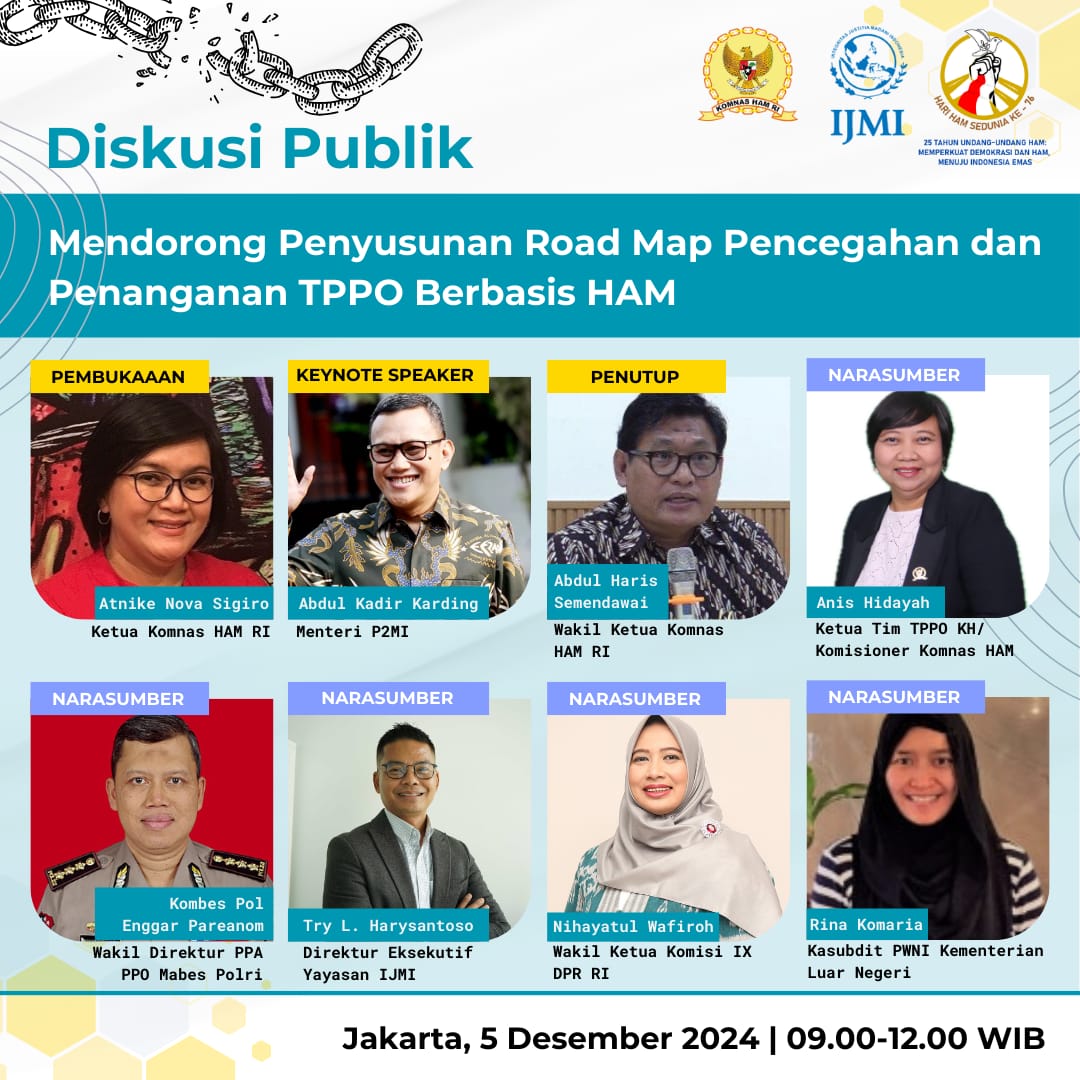The National Commission for Human Rights put Human Trafficking Crimes as a top human rights priority for 2022 to 2027. It established a monitoring team to assess the effectiveness of prevention and management of human trafficking crimes in 2023, in order to implement its review and research mandate and function as articulated in Law No. 39 Year 1999 on Human Rights.
One action taken by the Commission was prevention and management of human trafficking crimes in collaboration with a civil society organisation - Yayasan integritas Yustisia Madani Indonesia - a partner of the Internasional Justice Mission. This collaboration resulted in a prevention and management roadmap by the National Commission of Human Rights and IJMI on Thursday 5 December 2024 during a public discussion on preparing a human-rights-based human trafficking crime prevention and management roadmap.
Globalisation opens more opportunities for people to go across nations, across islands, across continents in search for work, for study, or for widening their experience, perspective and knowledge. National borders are “disappearing” so to say in globalized world, yet challenges and threats are coming - including human trafficking which is a crime in Indonesia and globally. This targets any group, not only men but also women, people of low income, as well as those of middle income searching for work.
The economic, knowledge, educational, and other opportunities become a global challenge for every nation.
Global Survey Index (GSI) says that Indonesia is one of ten countries with highest number of people living in servitude (not to read this state of servitude as in the past, because it is hidden and difficult to identify, with social relations characterized by exploitation). This is the state of modern slavery often missed in observation by communities and/or public officials at all levels.
There were 1,200 Indonesian migrant workers who became victims of human trafficking scam in Southeast Asia between 2020 and 2022, with the number increasing significantly by 752 cases in 2022, with most victims were recorded in Southeast Asia. The Indonesian Migrant Protection Authority or BP2MI noted that it saved as many as 5,800 non-procedural would-be migrants who became victims of human trafficking. Human trafficking happened via a number of ways – through conventional migrant worker engagement and through social media propaganda. The latter was a notable influence of the use of information technology globally, and of the propaganda conducted through job-training institutions. Workers experienced physical sexual violence, including breach of work contract or unpaid wages.
The National Commission of Human Rights established a partnership with a number of organisations, including the Yayasan Integritas of the International Justice (IJMI) during a human rights festival in Bitung in 2024. One collaboration agenda was to promote human-rights-based prevention and management through engagement with the Indonesian Police, and the safety-security-based approach to prevention and management through the Ministry of Foreign Affairs and the Indonesian representatives overseas.
Abdul Kadir Karding said that the Commission had conducted mapping regarding issues associated with migrant workers with the foreign ministry, which showed that the problem lied with illegal/non-procedural ways of human trafficking that made monitoring so challenging, leading to a lack of data on where migrant workers were, where they stayed, what work they were doing, who they were working for, and who sent them. The other issues related to the question of what (work) visa these workers were using, and whether they obtained a certificate or not. The total number was way much bigger that registered.
Addressing the issue may only solved at most 60-70% of the problem. He estimated that victims of human trafficking were migrant workers, but the question was which migrant workers, which ones were procedural, or inter-family connection, and these could be interesting to study.
Data of cases at the Ministry suggested that on average there remained plenty of issues, meaning whether they were registered or not, it should not have been a major issue whether someone was using informal or domestic channel. Abdul Kadir said that the key was to make sure that every person desiring to go overseas had to abide by Law No. 18 Year 2017 on Migrant Worker Protection and received Descent Income. For example, in the name of university, working together with university, companies,or training agencies, or working overseas as a representative of a company, to engage in internship under a school program, Basic and Mid-level education establishment – the person(s) should get an income for their work.
There were 11 Indonesian seamen drowned in Korea while working for a Korean shipping company. “Never dream that this human trafficking issue will be resolved comprehensively, as it will not, and we are making every efforts to address the situation. One way is to offer a way out, but this is only one way, as however one does it the regulation stays the same. We need to do whatever we can. The second, we look at the data that shows that the average migrant workers are informal or domestic workers, and mostly women. They do not have skills and this is one reason why the employer accept them.“ So our biggest work is to send skilled workers (formal) – making the informal into formal workers and improve certification,” said Abdul Kadir. (Ast)












